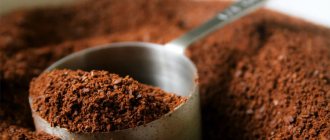coffee "
True connoisseurs of natural coffee never drink it in instant form. Coffee lovers talk about the drink like a good wine, distinguishing subtle shades of taste, acidity, sweetness, bitterness, notes of berries, chocolate, nuts and tobacco. To prepare different varieties and types, certain dishes are used, which enhance the taste and aroma of the drink. You can talk endlessly about the taste of coffee.
From picking berries from a tree to roasting aromatic grains, there is a long, interesting, complex path. The taste and aroma of the drink are given by essential oils - volatile compounds that evaporate over time. Therefore, when stored for a long time, coffee loses its richness.
Expired coffee beans
Raw beans (green coffee)
Expired raw coffee has a heterogeneous, as if faded, color of the beans; its grain structure is disturbed. It either quickly crumbles, or, on the contrary, becomes very hard, although fragile. Unroasted coffee that has passed its expiration date has no aroma at all or has an unpleasant odor.
Despite the expiration date, these grains can be roasted, ground and brewed. The fact is that expired coffee loses its aromatic and taste properties, but does not become dangerous to the human body and does not spoil in the usual sense of the word.
There have been no recorded cases of poisoning from expired coffee.
How to partially restore the taste of stale raw coffee beans?
- Roast with spices - anise, cloves, pepper, cinnamon will help saturate the grains with new aromas.
- Make a strong roast, perhaps deep heat treatment will help reveal the remaining aroma and taste.
Expired unroasted bean coffee may retain some caffeine, so it will not give a good taste to the drink, but it may invigorate you.
The shelf life of green coffee, subject to storage conditions, is 5 years.
Roasted grains
In sealed packaging, such coffee can be stored for up to 12 months, and in vacuum packaging - up to half a year. But a critical time is coming for him too. Like any type of natural bean, roasted coffee does not become unusable immediately after the date indicated as the deadline. It just gradually loses its taste and aromatic qualities.
Coffee from an unopened package can retain its basic properties even a year after the expiration date, so it can be safely consumed.
Signs of seriously expired roasted coffee beans:
- Strong oily shine
- Dark color
- The aroma is weak, with rancid notes of stale oil
Such grains have neither taste nor invigorating effect. There is simply no point in buying or using them; it is difficult for them to return the properties of the drink.
Expired roasted coffee can be used for decorative purposes, for counterfeiting, making cosmetic scrubs, or as elements of photographic compositions.
The situation is the same with freshly roasted beans without special packaging, only they have a much shorter shelf life. Coffee that is more than 2 weeks old is considered expired. After one and a half to two months, nothing will remain of its properties, and drinking it will simply be tasteless.
Is it possible to return the taste to expired food?
Adding spices and frying
You can try to breathe new life into the delay. But keep in mind that the taste and aroma will not be the same.
Try roasting green beans with some spices. A strong amber of cinnamon or cloves will eliminate the unpleasant odor.
Spices have antibacterial properties that will help neutralize bacterial growth.
The freshest drink is also drunk with syrups. Sweetness mutes the taste of expired food. More tips in the article “What else is added to coffee for taste and aroma.”
If you don’t like oriental notes, try frying it in a hot frying pan without additional ingredients. This will help release the natural flavors hidden within the beans.
If roasted grains have spoiled, it is better not to experiment with restoring quality. But don’t rush to throw away the expired items. There are other ways to use coffee beans.
Alternative uses
Roasted coffee beans are useful in interior decor. For example, for decorating photo frames, flower pots, vases, bottles.
You can make Christmas decorations, scented candles or coffee topiaries. There is a lot of information on this topic on the Internet, with step-by-step instructions.
Often roasted and ground grains are used in cosmetology in beauty salons and at home.
Face masks and scrubs based on ground powder will help refresh and tighten the skin.
Interesting! Barista - who is he, what is his profession and what does he do?
Hair masks will restore shine and smoothness to your hair.
Cosmetic coffee wraps remove excess fluid from the body and help fight cellulite. The skin after the procedure is smoothed and softened.
Expired ground coffee
The shelf life of packaged and freshly ground coffee is different.
- In an airtight container, ground coffee can be stored for up to 12 months. Even if a shorter period is indicated on the packaging, but the pack remains unopened and well sealed, its contents will partially retain their properties for up to a year.
The expiration date indicated by the manufacturer on coffee packages is the time during which this type of product retains its properties and characteristics as much as possible.
- Vacuum-packed briquettes of ground coffee can be stored even longer, up to three years. Sometimes the package indicates a shorter shelf life, for example, 18 or 24 months. During this time, the powder retains the entire required amount of taste and aroma. Then it gradually loses its properties.
Expired ground coffee in packaging that has been stored for less than 3 years can be used, although the taste and aroma may be much weaker.
- Freshly ground coffee is recommended to be consumed within 2 weeks after production. But you can drink it even after a month if you pack it in foil and then in an opaque jar with a ground-in lid. With this storage method, the powder will lose its properties more slowly, and even after the expiration date has expired, it is quite capable of providing a cup of a tonic drink.
- The critical period for unsealed ground coffee is 1 month. After this, it loses more than 90% of all its properties. You can drink it, you won’t be able to get poisoned by it, but essentially it will only be colored hot water, perhaps with a slight semblance of coffee aroma.
Different types of storage containers
There are several types of packaging in which coffee is usually kept:
- Paper bags;
- Containers made of plastic or metal;
- Foil packaging with check valve;
- Glass or ceramic containers with a tight-fitting lid.
Each type has its pros and cons, which are worth considering in more detail.
Coffee is most often sold in bags made of paper in stores. But this is not the best packaging for the product. It is quite thin and does not protect well from environmental influences. Therefore, after purchasing, when you come home, it is advisable to pour the coffee into another, more suitable container for storage.
Metal and plastic containers are separated into a single group, since both are poorly suited for storing coffee in them for a long time. The reason for this is that these materials tend to give the product an unpleasant aftertaste, and can themselves become saturated with its odor, which is difficult to remove.
You might be interested in: The benefits and harms of ground coffee
Very often glass or ceramic jars are used for this purpose. It is advisable that the lid be equipped with a silicone seal to ensure the tightness of the package. If the container is transparent, then it is advisable to place it in a dark place to prevent exposure to sunlight. The disadvantage of such containers is that there is no possibility of removing carbon dioxide from it.
Therefore, grains that have been roasted independently can be transferred to a jar only after a day. During this time, gases and excess moisture will come out of them.
The best storage option is foil bags equipped with a special clasp and valve. They significantly increase the shelf life of coffee. The opaque material prevents sunlight from reaching the product, and the non-return valve allows excess gas to escape freely from the packaging.
Expired instant coffee
What happens to instant coffee after its expiration date?
- The shelf life of ersatz is 2 years. After this, it does not spoil, but only loses some of its aroma and taste.
- Aromatic compounds gradually decompose as a result of oxidative processes. Considering the number of chemical components in this type of coffee, the loss of taste occurs slowly. So a hermetically sealed jar of instant coffee can be used after three years.
There are cases when soluble granules, even 5 years after release, gave a completely suitable solution, with a coffee smell and taste.
Instant coffee can be stored in an unsealed jar for a couple of months, after which it will increasingly lose taste and smell. But even if the expiration date of this product has expired a long time ago, and you still decide to make yourself a drink, then you are guaranteed a rich color and bitter taste.
You also don’t have to worry about any dangerous consequences for the body - an eating disorder or poisoning - although who knows how the chemical compounds will behave over time.
Storage conditions
To ensure that the aromatic product does not lose its taste during its shelf life, several simple rules should be followed when storing it:
- Any instant coffee, ground or grain, must be kept in an airtight container.
- A transparent jar of product should not be left in the light.
- It is not advisable to store soluble powder or granules in a tin container for a long time, otherwise they may acquire a metallic taste, and the drink from them will be unpleasant to drink.
- At first, roasted grains release a large amount of carbon dioxide. Therefore, at the beginning of storage, you need to release it every day by opening the container lid.
- Roasted grains remain fresh for a long time when frozen. But when placing them in the freezer, you should take into account the ability of coffee to absorb odors.
- Green beans, like capsules, do not tolerate high temperatures very well. Therefore, you need to choose a dark, cool place to store them.
Compliance with these simple rules is the key to obtaining a tasty and aromatic drink throughout its shelf life.
We advise you to read: Tea bags - benefits or harm.
photo: depositphotos.com/wideonet, belchonock
Coffee capsules
A new product on the coffee market is coffee in capsules.
- The shelf life of coffee capsules is from 9 to 24 months, depending on the manufacturer.
- The peculiarity of the capsules is their individual sealed packaging. Essentially, each serving of coffee is stored in ideal conditions - a minimum of air, light and moisture. Even when taken out of a common pack or box, the capsule remains sealed, carefully protecting the portion it contains from external influences.
Therefore, this type of drink can be safely used even after the official expiration date. The maximum you risk is weakened aromatic qualities of coffee.
Coffee from a punctured or damaged capsule loses its properties within a few days.
When the deadline expires
It is, of course, better not to brew expired coffee at all, especially if it has uncharacteristic aromas or an unpleasant aftertaste. And also in the case when mold fungi appear. Even one cup of such a drink will not only not bring pleasure, but will most likely cause poisoning (mild or severe - depending on the strength of your body). In addition, a product made from roasted grains that have expired can also cause harm. It's all about fat, which has the property of spoiling.
By the way, in numerous soluble variations there is practically no fat, and therefore, if the powder was stored according to the rules, it can be dissolved even after a while. Although, undoubtedly, such an expired product is unlikely to produce a drink with characteristic tastes and aromas. So the choice is yours. But it’s easier not to stock up on too much coffee so as not to take risks.
The dangers of expired coffee
What threatens the daredevil who dares to try expired coffee?
- There is no direct or immediate health hazard. There is no confirmed evidence of poisoning or negative health after drinking expired coffee of any kind.
- Grains or powder whose expiration date has passed lose their taste and aroma, but this does not happen all at once, but gradually. Slower for beans, faster for ground coffee.
- The older the coffee, the less caffeine it contains, so the invigorating properties of an expired drink are reduced or completely eliminated.
It is better to drink expired coffee with additives - spices, sugar, milk, honey, cream - this will slightly revive the flavor range.
Expired coffee is not dangerous to humans, but it is not very tasty either. Therefore, try not to lose packs of grains in the depths of your cupboards and drink only a fresh drink.
In the article about storing coffee, we already described in detail how to preserve the properties of beans and ground coffee longer after opening the pack. Let us remind you once again that we recommend buying coffee in such a way that the opened pack can be consumed within the next week, maximum two. For example, if you brew coffee only twice a day, then a 250 gram pack will be enough for you for a week. If your family appreciates, loves and actively drinks coffee, then you can buy large packages. When stocking up for future use, try to buy several small packages, this makes it easier to store coffee.
| Type of coffee | Shelf life | Duration of use without harm to health |
| Green coffee | 24 months | 5 years |
| Roasted grain | 12 months | 3 years |
| Freshly roasted grain without special ingredients. packaging | 2 weeks | 3 years |
| Ground coffee in a pack | 12 months | 3 years |
| Freshly ground coffee without special ingredients. packaging | 2 weeks | 3 years |
| Soluble | 24 months | 5 years |
| In capsules | 12-24 months | 5 years |
What happens to green coffee?
Green grains in closed packages can be stored for up to 5 years. A number of varieties are artificially aged to achieve a change in taste. This is done in India and Sumatra, however, while observing a number of certain conditions.
In any case, even expired green coffee does not pose a health threat - it can be safely roasted and drunk. There are a number of signs by which it is determined that the product has not just exceeded its expiration date, but has deteriorated.
Signs of spoiled coffee:
- heterogeneous structure;
- increased fragility or hardness of grains;
- lack of aroma;
- loss of color.
You can correct the situation by roasting the grains with the addition of aromatic spices: cloves, cinnamon, cardamom and pepper. More intense roasting can also partially restore the lost properties of the product.
Duration of storage of ground grains
Most lovers of the aromatic invigorating drink prefer to purchase it in whole grains. This is due to the fact that it is very difficult to store it in crushed form; it quickly loses its properties. If you purchased ground coffee in vacuum packaging, then after opening it can be stored for no more than two weeks. The essential oils contained in it evaporate very quickly. The shelf life of ground coffee, if it was ground yourself, does not exceed three days.
Coffee lovers advise:
- Purchase exclusively whole grains and grind them in a coffee grinder immediately before preparing the drink.
- If you still decide to buy ground coffee, then you should not buy it for future use; it is better to opt for a small amount.
- It is best to store it in a tightly sealed container, as far as possible from any strong-smelling products.
- Avoid exposure to moisture and direct sunlight.
Recommendations for storing in the refrigerator and freezer
The freezer is one of the possible places to store coffee beans. They can be either raw or fried. Moreover, in the second case, freezing should be “shock” and carried out immediately after heat treatment.
One of the options for long-term storage is the freezer
It is not worth storing a large number of grains in one package at once. In this case, every time you want to drink a cup of coffee, you will have to remove the beans from the cold and keep them warm for a while, then return them back to the freezer shelf. Such temperature changes will turn the grains into a tasteless and odorless product within a couple of months.
It is better to package them in small portions and defrost as needed. It is very important, after the grains are warm, to allow them to thaw on their own: you should not heat them in the microwave or place them near heating appliances. Grinding half-frozen beans is also not a good idea. The optimal temperature for grains ready for further processing and grinding is 15 degrees.
It is better to freeze in small portions; before grinding the grains, you need to defrost them completely.
Even in a frozen state, grains are extremely susceptible to odors, so products with a strong odor, such as fish, meat, seafood, etc., should be kept as far away as possible, otherwise an off-flavor in the finished drink cannot be avoided.
What kind of coffee can be stored for a long period
For a long-term supply, you should give preference when purchasing green beans.
If you plan to store coffee for a long time, and you need to purchase quite a large amount, then raw green beans will be the best option. Their undoubted advantage is their low cost compared to roasted and ground grains. In addition, they are the least demanding on storage conditions, since the aromatic substances are securely contained inside. In this regard, the main requirement is a constant temperature not exceeding 20 degrees. Optimal humidity is also necessary, otherwise the grains will become damp and begin to mold.
An excellent place for storage would be a kitchen cabinet or niche away from heating appliances in bright sunlight.
If the bag of grains is quite voluminous, you should cut its corner without damaging the rest of the package. Having poured the required amount, the cut must be tightly twisted and secured, for example, with a paper clip.
The convenience of buying a large supply of raw coffee beans is that you have a fresh drink at hand at any time: you just need to roast and grind a small handful of beans. At the same time, the coffee will have a deep taste and rich aroma, because the time between heat treatment and brewing of the drink is minimal.
Expiration date by brand
The expiration dates for coffee from different brands may vary slightly. The manufacturer already indicates on the packaging how long the drink can be stored. The timing depends on the packaging, and not on the properties of the powder itself.
Deadlines by brand:
- Instant Tchibo: 24 months.
- Japanese coffee Blendy: 12 months.
- Argentine La Morenita Clasico: 6 months.
All deadlines are indicated on the packs. Even on Japanese Blendy you can find the release date without looking at the hieroglyphs.











